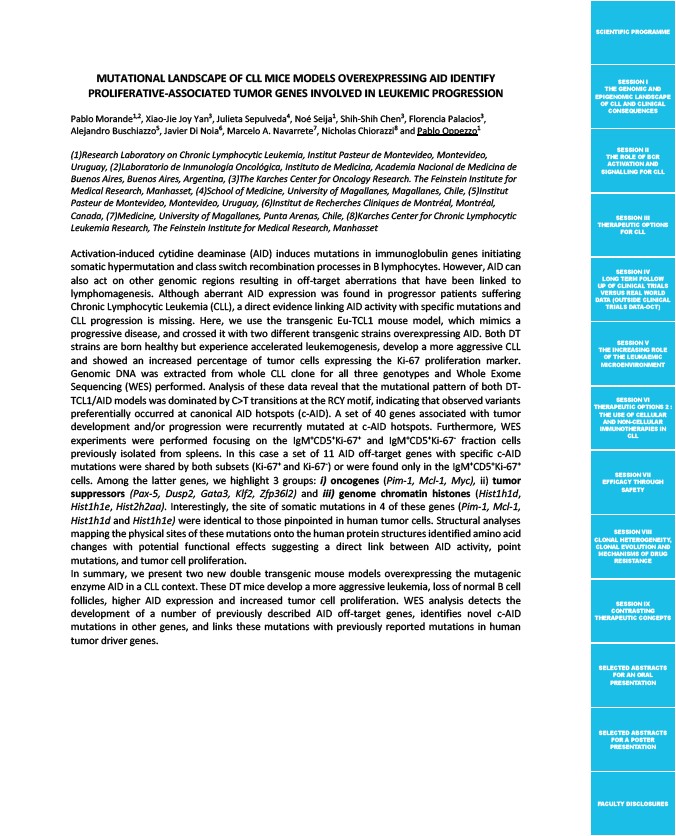
SCIENTIFIC PROGRAMME
SESSION I
THE GENOMIC AND
EPIGENOMIC LANDSCAPE
OF CLL AND CLINICAL
CONSEQUENCES
SESSION II
THE ROLE OF BCR
ACTIVATION AND
SIGNALLING FOR CLL
SESSION III
THERAPEUTIC OPTIONS
FOR CLL
SESSION IV
LONG TERM FOLLOW
UP OF CLINICAL TRIALS
VERSUS REAL WORLD
DATA (OUTSIDE CLINICAL
TRIALS DATA-OCT)
SESSION V
THE INCREASING ROLE
OF THE LEUKAEMIC
MICROENVIRONMENT
SESSION VI
THERAPEUTIC OPTIONS 2 :
THE USE OF CELLULAR
AND NON-CELLULAR
IMMUNOTHERAPIES IN
CLL
SESSION VII
EFFICACY THROUGH
SAFETY
SESSION VIII
CLONAL HETEROGENEITY,
CLONAL EVOLUTION AND
MECHANISMS OF DRUG
RESISTANCE
SESSION IX
CONTRASTING
THERAPEUTIC CONCEPTS
SELECTED ABSTRACTS
FOR AN ORAL
PRESENTATION
SELECTED ABSTRACTS
FOR A POSTER
PRESENTATION
FACULTY DISCLOSURES
MUTATIONAL LANDSCAPE OF CLL MICE MODELS OVEREXPRESSING AID IDENTIFY
PROLIFERATIVE-ASSOCIATED TUMOR GENES INVOLVED IN LEUKEMIC PROGRESSION
Pablo Morande1,2, Xiao-Jie Joy Yan3, Julieta Sepulveda4, Noé Seija1, Shih-Shih Chen3, Florencia Palacios3,
Alejandro Buschiazzo5, Javier Di Noia6, Marcelo A. Navarrete7, Nicholas Chiorazzi8 and Pablo Oppezzo1
(1)Research Laboratory on Chronic Lymphocytic Leukemia, Institut Pasteur de Montevideo, Montevideo,
Uruguay, (2)Laboratorio de Inmunología Oncológica, Instituto de Medicina, Academia Nacional de Medicina de
Buenos Aires, Buenos Aires, Argentina, (3)The Karches Center for Oncology Research. The Feinstein Institute for
Medical Research, Manhasset, (4)School of Medicine, University of Magallanes, Magallanes, Chile, (5)Institut
Pasteur de Montevideo, Montevideo, Uruguay, (6)Institut de Recherches Cliniques de Montréal, Montréal,
Canada, (7)Medicine, University of Magallanes, Punta Arenas, Chile, (8)Karches Center for Chronic Lymphocytic
Leukemia Research, The Feinstein Institute for Medical Research, Manhasset
Activation-induced cytidine deaminase (AID) induces mutations in immunoglobulin genes initiating
somatic hypermutation and class switch recombination processes in B lymphocytes. However, AID can
also act on other genomic regions resulting in off-target aberrations that have been linked to
lymphomagenesis. Although aberrant AID expression was found in progressor patients suffering
Chronic Lymphocytic Leukemia (CLL), a direct evidence linking AID activity with specific mutations and
CLL progression is missing. Here, we use the transgenic Eu-TCL1 mouse model, which mimics a
progressive disease, and crossed it with two different transgenic strains overexpressing AID. Both DT
strains are born healthy but experience accelerated leukemogenesis, develop a more aggressive CLL
and showed an increased percentage of tumor cells expressing the Ki-67 proliferation marker.
Genomic DNA was extracted from whole CLL clone for all three genotypes and Whole Exome
Sequencing (WES) performed. Analysis of these data reveal that the mutational pattern of both DT-TCL1/
AID models was dominated by C>T transitions at the RCY motif, indicating that observed variants
preferentially occurred at canonical AID hotspots (c-AID). A set of 40 genes associated with tumor
development and/or progression were recurrently mutated at c-AID hotspots. Furthermore, WES
experiments were performed focusing on the IgM+CD5+Ki-67+ and IgM+CD5+Ki-67- fraction cells
previously isolated from spleens. In this case a set of 11 AID off-target genes with specific c-AID
mutations were shared by both subsets (Ki-67+ and Ki-67-) or were found only in the IgM+CD5+Ki-67+
cells. Among the latter genes, we highlight 3 groups: i) oncogenes (Pim-1, Mcl-1, Myc), ii) tumor
suppressors (Pax-5, Dusp2, Gata3, Klf2, Zfp36l2) and iii) genome chromatin histones (Hist1h1d,
Hist1h1e, Hist2h2aa). Interestingly, the site of somatic mutations in 4 of these genes (Pim-1, Mcl-1,
Hist1h1d and Hist1h1e) were identical to those pinpointed in human tumor cells. Structural analyses
mapping the physical sites of these mutations onto the human protein structures identified amino acid
changes with potential functional effects suggesting a direct link between AID activity, point
mutations, and tumor cell proliferation.
In summary, we present two new double transgenic mouse models overexpressing the mutagenic
enzyme AID in a CLL context. These DT mice develop a more aggressive leukemia, loss of normal B cell
follicles, higher AID expression and increased tumor cell proliferation. WES analysis detects the
development of a number of previously described AID off-target genes, identifies novel c-AID
mutations in other genes, and links these mutations with previously reported mutations in human
tumor driver genes.